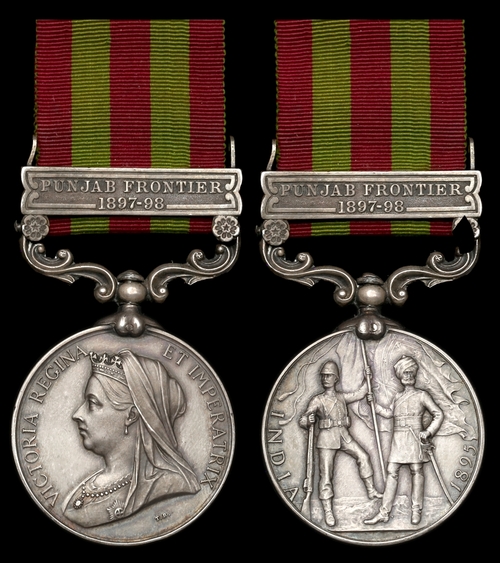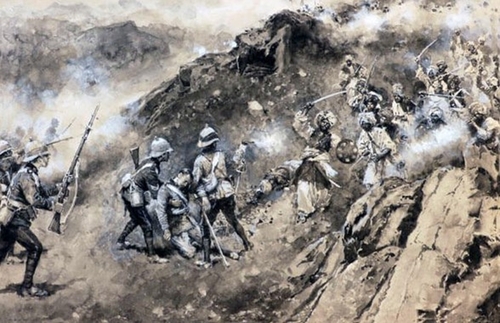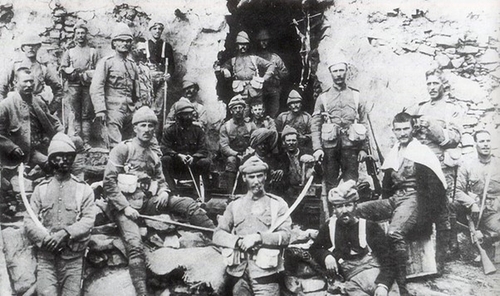Auction: 25003 - Orders, Decorations and Medals
Lot: 26
The India General Service Medal awarded to Lieutenant J. Golding, 1st Battalion, Royal West Kent Regiment, late Sergeant, 13th Hussars
Having achieved the rare distinction of gaining a commission direct from the ranks, he was present at two bloody engagements in the Swat Valley on the Punjab Frontier in 1897, in which his regiment sustained more casualties than any other British unit engaged
India General Service 1895-1902, 1 clasp, Punjab Frontier 1897-98 (Lieut. J. Golding, 1st Royal West Kent Regt.), minor official correction to surname, good very fine
John Golding was born on 11 May 1861, the son of Thomas and Isabella Golding of Walsham le Willows, Suffolk.
Having served in the West Suffolk Militia, he enlisted in the 13th Hussars in 1882 and rose through the ranks until attaining the rank of Sergeant. Unusually for the period, he subsequently obtained a commission - as a 2nd Lieutenant in the Royal West Kent Regiment - in January 1890. News of the appointment appeared in The Suffolk and Essex Free Press on the 12th:
'A meeting was held in the Sergeants' Mess Room of the 13th Hussars at Piershall Barracks, Edinburgh on the 4th inst. on the occasion of bidding farewell to Sergeant J. Golding (who is a son of Mr. T. Golding of Walsham le Willows) who has been promoted to a Second Lieutenancy in the Royal West Kent Regiment. The evening was opened by the presiding Regimental Sergeant-Major who in presenting Lieutenant Golding on behalf of the mess with a carriage clock said he had known Lieutenant Golding during his service to be an exemplary N.C.O.; that he was well liked by all ranks and that during his three years in the mess had been a credit to it. He hoped he would prosper in the new regiment as he had in the old one. Lieutenant Golding in responding said that during his years in the 13th Hussars he had always found friends and trusted that he might find as open-hearted ones in the new regiment … '
Promoted to Lieutenant in October 1893, Golding was subsequently embarked with the 1st Battalion for India, where he saw action on the Punjab Frontier.
Those operations commenced with the relief of Chakdara in July 1897, but it was in an action at Landaki on 17 August 1897 that the Battalion took its first serious casualties. Opposed by 5,000 tribesmen - including fanatical Ghazi warriors - the Royal West Kents nonetheless cleared the enemy held strongpoints at the point of the bayonet.
Notwithstanding losses of four killed and 29 wounded at Landaki, Golding and his comrades were quickly back in action in an attack against rebel held villages on 29 September 1897. On that date, a powerful force, comprising the Guides Cavalry, No. 7 Mountain Battery, R.A., 1st Royal West Kent Regiment, 31st Punjab Infantry, 38th Dogras and the Guides Infantry, led by Brigadier-General Jeffreys, the brigade commander, marched up the valley to attack Agrah and Gat.
As the troops approached the villages, a large force of tribesmen could be seen on the high ground to the west, in a position of considerable strength, with more tribesmen joining them.
A rocky precipitous ridge divided the space between Agrah and Gat, while on either flank were steep boulder-strewn spurs, commanding the ground over which the troops would advance.
The Guides Cavalry began the attack, advancing along the Kakazai Nala, for some distance up the mountainside and then, dismounting and opening rifle fire on the tribesmen.
The main attack required the Guides Infantry to advance up the western spur, with the Royal West Kents on their right, advancing through the gap between the two villages to a position in the rear of Agrah. The 31st Punjab Infantry were to occupy the rocky ridge between the villages. The Dogras remained in reserve.
The mountain guns opened fire from the bank of a nala, a mile and a half south of Gat, in support of the 31st Punjab Infantry, bombarding the tribesmen holding the rocky ridge.
The tribesmen held their positions on the ridge with great determination and had to be driven out by the 31st Punjab Infantry, at the point of the bayonet. In the course of the attack, the commandant of the battalion, Lieutenant-Colonel O'Bryen, a particularly promising officer, received a mortal wound from which he later died.
To assist the 31st Punjab Infantry in their difficult and heavily resisted attack, Brigadier General Jeffreys moved two companies from the reserve to a knoll on their right, to provide support and ordered the mountain guns to move half a mile forward and shell the ground east of Gat, to cut off the route for tribal reinforcements into Gat.
The Guides Infantry were heavily involved in checking the tribesmen to the front and left flank. The Royal West Kents advanced onto the ridge above Agrah and, from there, covered the Sappers and Miners as they destroyed the village.
Once the destruction of Agrah was complete, the Royal West Kents moved east to support the 31st Punjab Infantry and encountered numbers of tribesmen positioned in stone sangars, who resisted their advance fiercely.
As a party of Royal West Kents cleared a sangar, Lieutenant Clayton Browne was killed and several men wounded. A force of swordsmen charged the troops and drove them out of the sangar, whereupon the supporting company of the Royal West Kents advanced with the bayonet and dispersed the tribesmen.
By now, Gat was partially destroyed, but more tribesmen were advancing from Zai and the commanding officer of the Royal West Kents considered it prudent to withdraw his battalion.
Once clear of Gat, the whole force retired to the camp at Inayat Kila, arriving at 4.30 p.m.
British casualties on the day amounted to two officers and 10 men killed, and seven officers and 42 men wounded. Tribal casualties were severe. Four leading maliks were known to have been killed and there were many dead bodies in and around Gat.
Postscript
Following his return home, Golding obtained a Captaincy in the Suffolk Regiment but he died in Walsham le Willows in June 1898. He had married Ethel Ada Blythe from an army family in Malta in November 1891, a year after the death of her father, Lieutenant-Colonel Samuel Fritche Blythe of the 35th Royal Sussex Regiment. They had a daughter, Ellen.
Subject to 20% VAT on Buyer’s Premium. For more information please view Terms and Conditions for Buyers.
Sold for
£420
Starting price
£160









